Whey protein is among the best sources of protein available, packed with essential amino acids the body can absorb quickly and use to build muscle and strength, as well as supporting weight loss.
Whether you are looking to build lean muscle or just improve your diet with added protein, a whey protein supplement is a great way to go. Here are our research team’s rankings of the best protein powders on the market.
Research
Rankings
Last updated: April 11, 2023
Whey protein supplements considered: 35
Hours of research: 52
Experts reviewed: 7
Scientific papers referenced: 44
1. Transparent Labs Grass-Fed Whey Protein
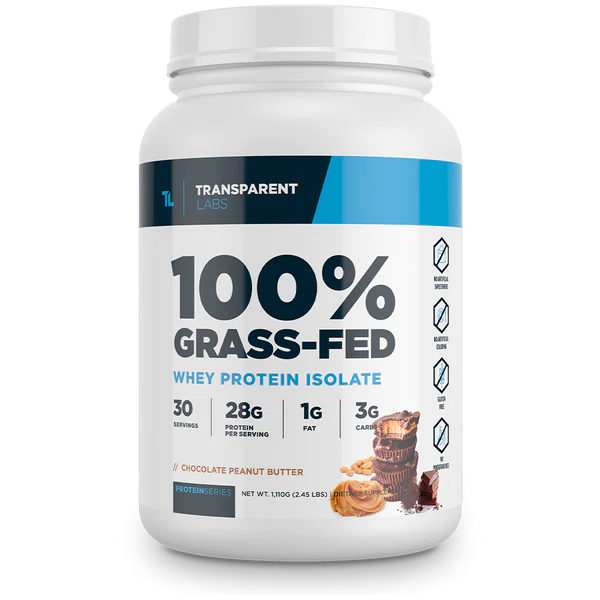
Click here for the lowest price
Transparent Labs is one our top choices for a few reasons: it’s arguably the purest protein out there: no additives, no artificial sweeteners, no GMOs.
Just pure, grass-fed protein isolate – made from naturally fed, hormone-free cow whey and clean of food dyes, gluten, and preservatives.
It contains one of the market’s highest protein-by-weight ratios at 82% (24 grams of protein per 29.46 gram scoop), making it one of the ideal whey for a post-workouts and hitting your daily protein goals.
If you are going to invest in whey protein powder, this is BodyNutrition’s top choice.
2. Ladder Whey Protein Powder
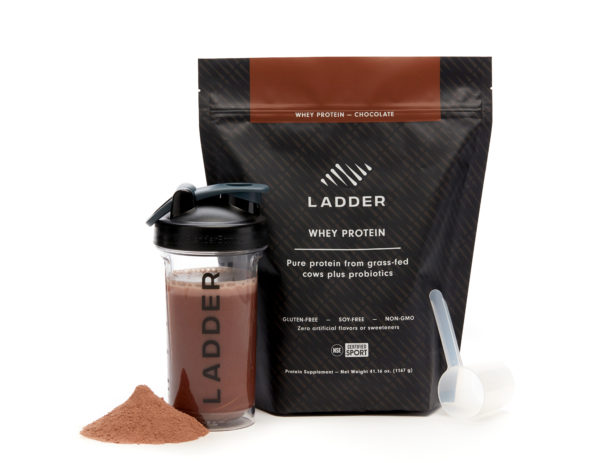
Click here for the lowest price
Ladder’s whey protein is NSF-certified for sport, making it the ideal choice for athletes and purists. It contains a mix of fast digesting whey isolates and slow digesting casein to maximize protein synthesis, recovery and muscle growth.
Ladder provides two delicious flavors, using only natural cocoa powder and vanilla extract, without the use of any artificial sweeteners, colors, and flavors. We would recommend getting one of each to keep the variety.
3. Battle Ready Fuel Military Whey
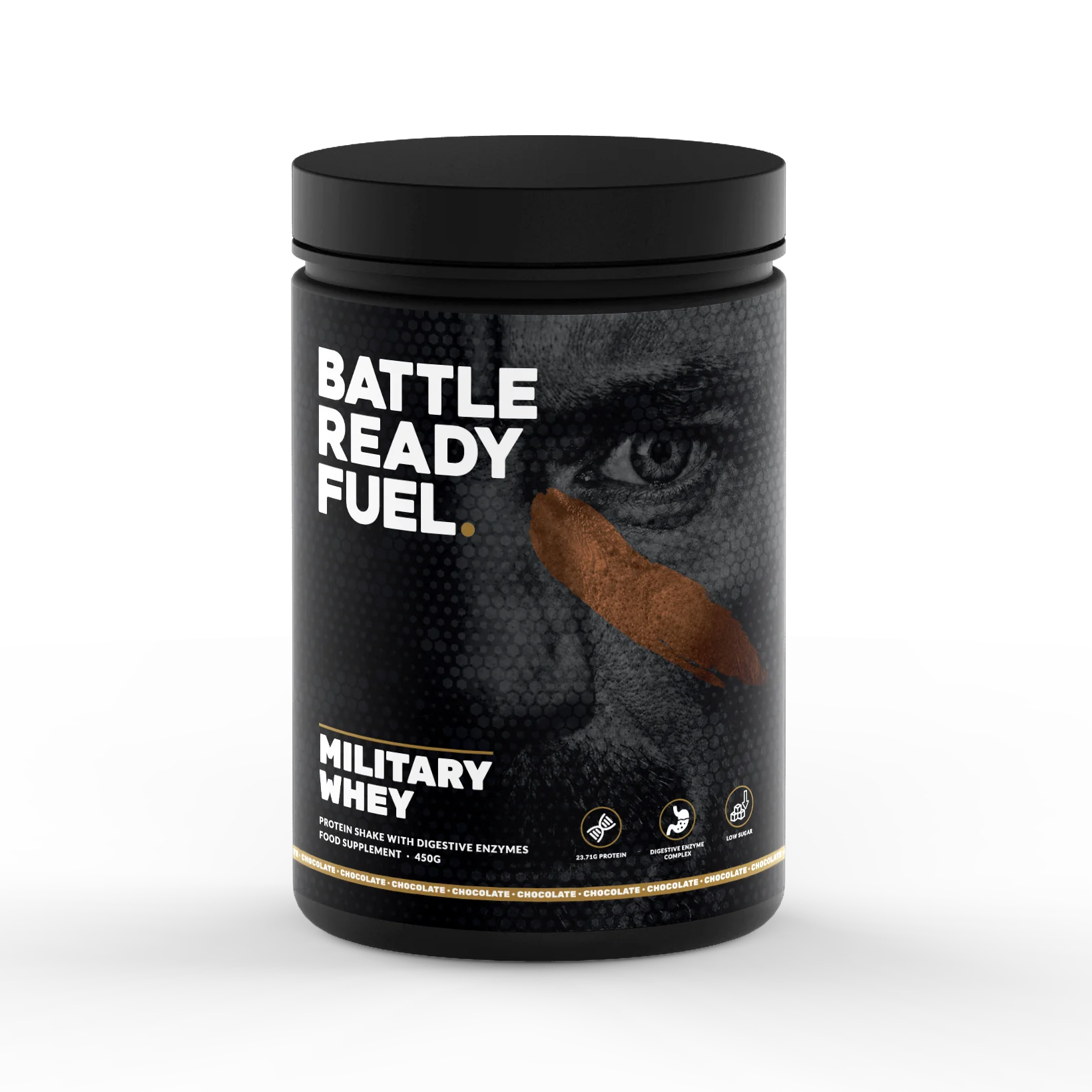
Click here for the lowest price
Battle Ready Fuel Military Whey is an all-around excellent product. Mainly because it’s pure. They use 90% whey isolate to give your body the nutrition it needs, without messing around with fillers or extras.
It also packs in a ton of benefits. It promotes lean muscle growth, absorbs quickly to feed your muscles fast, contains very small amounts of carbs, fats, and sugars, and packs in 28g of protein per serving.
It’s about as close as you can come to just pure protein — everything you need to be ‘battle ready’ when you hit the gym, the court, or the field!
Plus, it has a rich triple-chocolate flavor that helps it to actually taste great.
4. MyProtein Impact Whey Protein
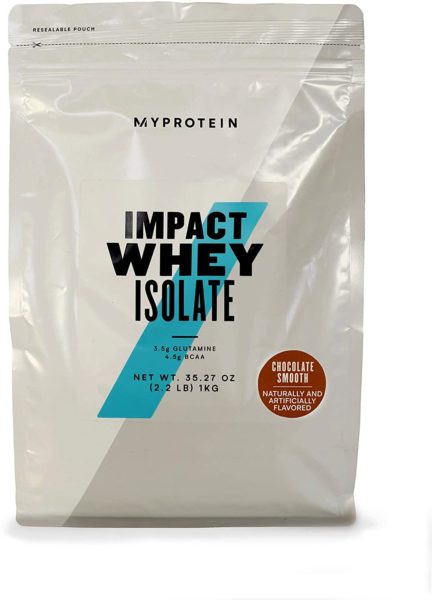
The simple foil packet and design of MyProtein Impact Whey Protein is representative of the company’s overall philosophy.
The goal is to provide pure, high-quality supplements in a cost-effective way.
For this reason, it comes in a resealable bag instead of a protein tub. It also only has two ingredients, whey protein isolate and soy lecithin, an emulsifying agent which helps the powder disperse better in solutions.
It includes no preservatives, but this should not be a big issue—protein isn’t a fertile ground for growing bacteria until it’s been mixed with water (the pure powder is just too dry).
The flavored varieties of MyProtein Impact Whey add only a couple additional ingredients; usually it’s a natural flavoring, the non-caloric sweetener sucralose, and sometimes a coloring agent.
5. Levels Nutrition Whey Protein
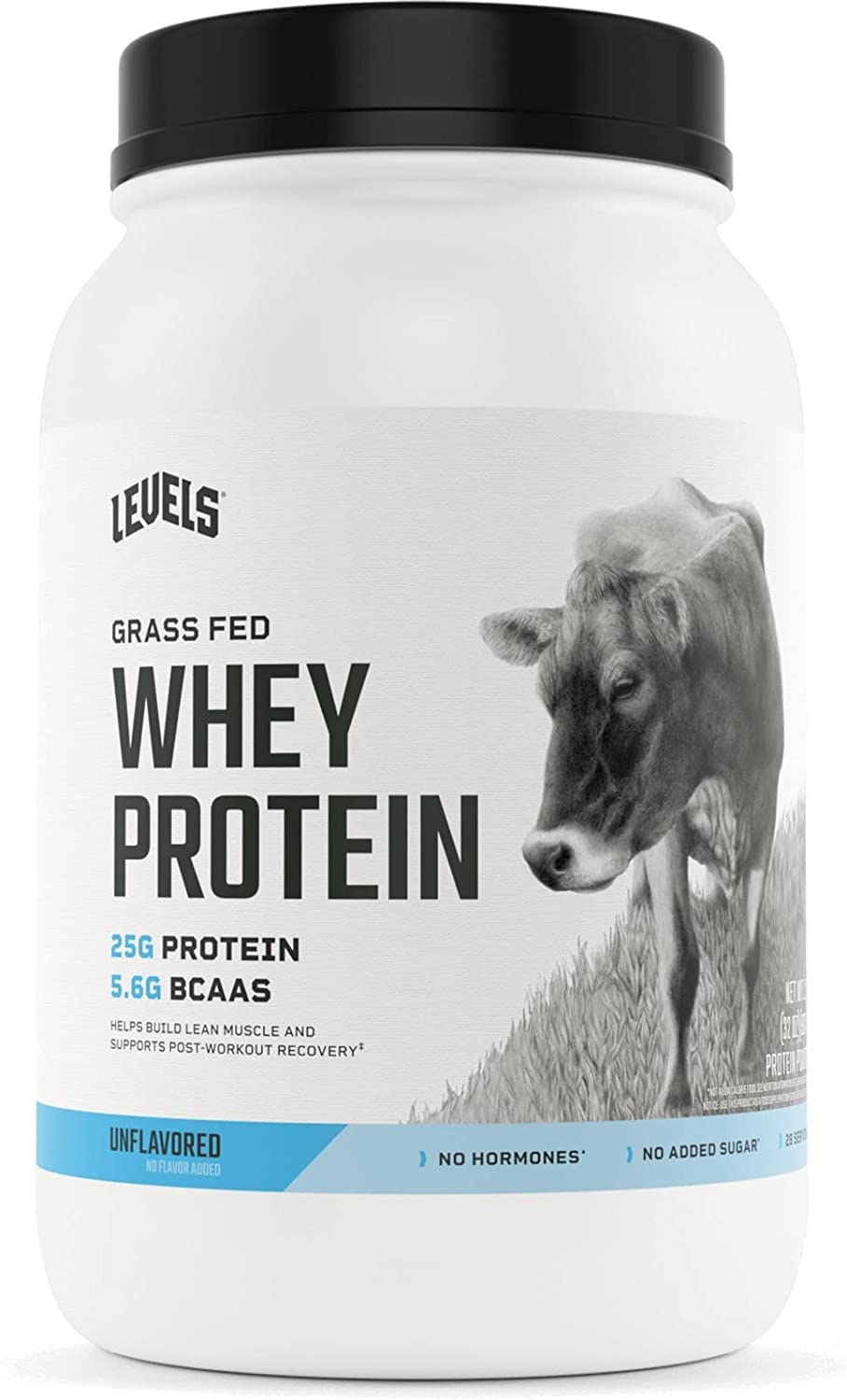
Levels Nutrition has a reputation for carefully formulated, high-quality and well-tested supplements. It’s super-pure and has a high concentration of protein.
There are no added sugars, sweeteners, or preservatives. Notably, the lack of soy lecithin is good news for people who can’t eat soy-containing foods—almost every other protein supplement includes soy lecithin.
6. Jarrow Formulas Whey Protein
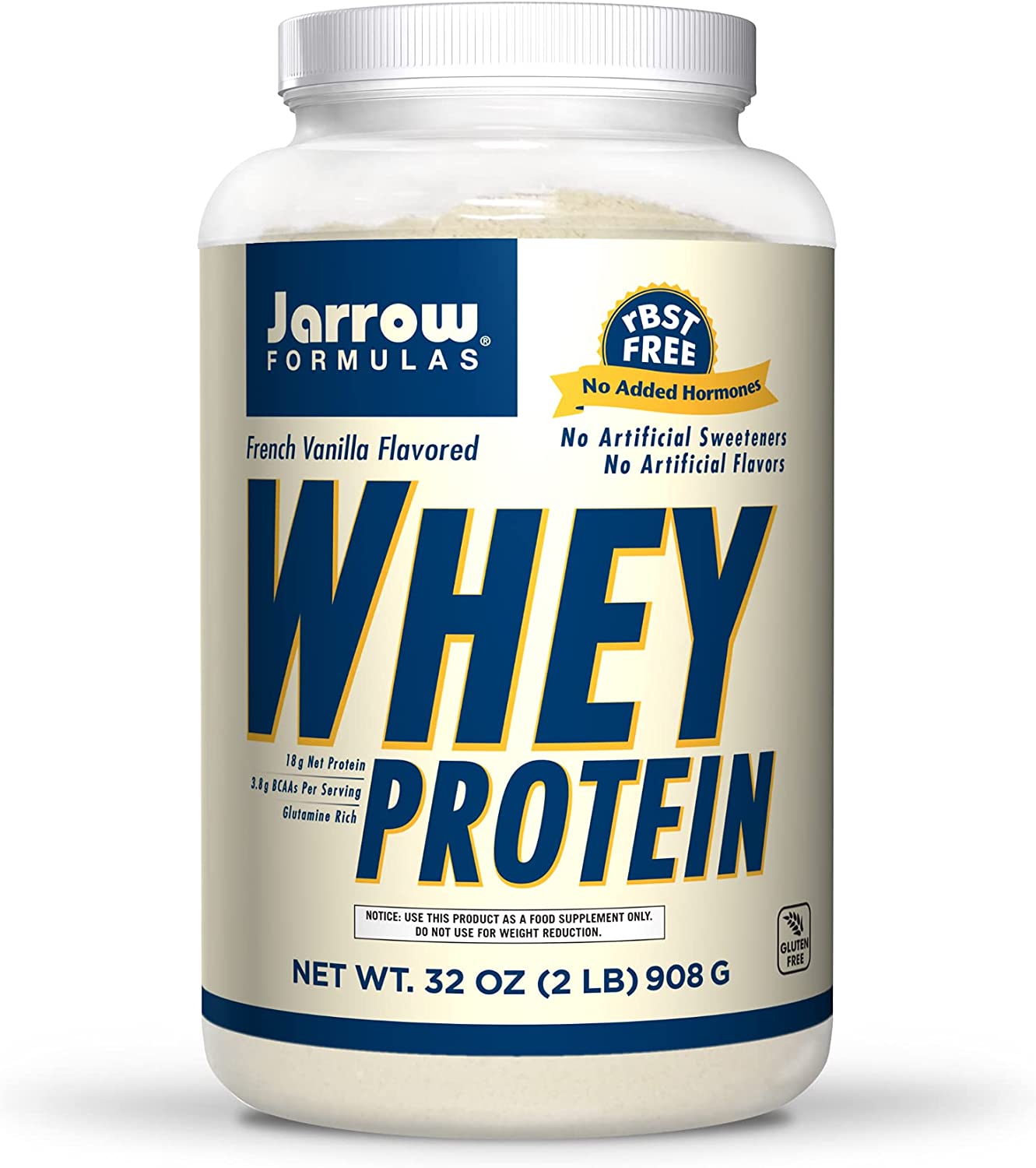
Jarrow Formulas Whey Protein is a protein purist’s dream—the only two ingredients are whey protein and soy lecithin, which is used as an emulsifying agent.
If the bland, chalky taste of unflavored protein is not your cup of tea, try the flavored varieties; if you are a purist and don’t want any extras in your supplement, go for the unflavored variety. Either way, it’s hard to go wrong with Jarrow Formulas Whey Protein Powder.
7. Legion Whey +
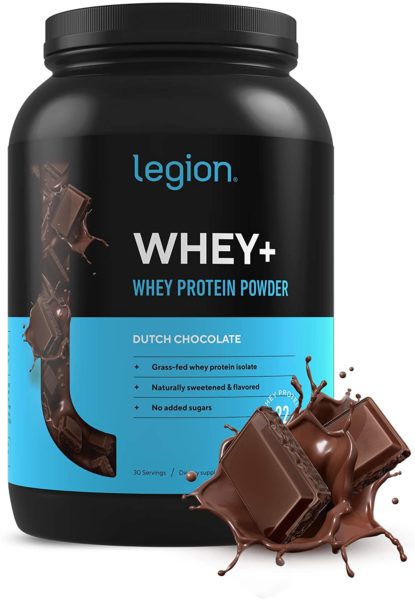
The black container and subdued labeling suggest that this whey protein supplement means business.
Its whey protein isolate, which comes from non-GMO sources, makes up 79% of the weight of each serving of Legion Whey +.
It’s flavored lightly with maltodextrin (a complex carbohydrate included in a very small amount for flavoring purposes; it also comes from a non-GMO source), plus the natural sugar substitute stevia leaf extract.
One attractive property about pure whey protein isolates, like Legion Whey +, is that they are almost completely lactose-free, so if you have mild lactose intolerance, you may still be able to use whey protein.
8. Optimum Nutrition 100% Whey Gold Standard
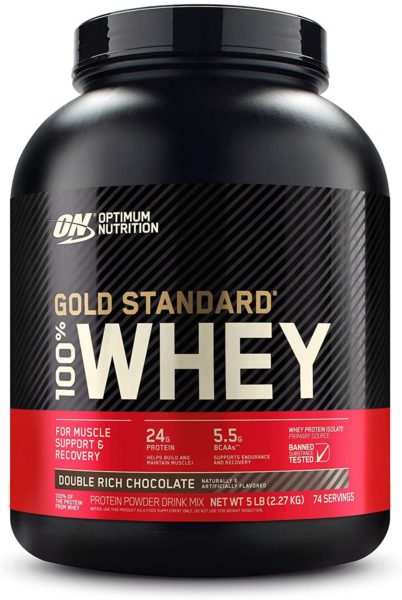
Optimum Nutrition is a big name when it comes to whey protein. This powder-based supplement includes a blend of whey protein concentrate, whey protein isolate, and whey protein peptides. It’s also arguably the best-tasting whey protein powder on the market.
One unique selling point of Optimum Nutrition’s whey protein offering is the inclusion of aminogen and lactase, a blend of enzymes that aid digestion of the protein powder.
Aminogen is a patented enzyme blend that is supposed to increase absorption of branched chain amino acids, while lactase is a well-known enzyme that helps you digest dairy products (including whey).
If you have mild lactose intolerance, you might still be able to tolerate a protein shake with Optimum Nutrition Whey Gold Standard on account of the lactase enzymes included.
9. MET-Rx Natural Whey Protein
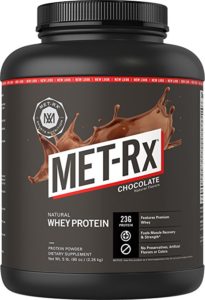
MET-Rx Natural Whey is a protein powder that delivers whey-derived protein in two forms, protein isolate and protein concentrate.
The total protein content amounts to just under 70% by weight, which is slightly below average, but not outrageously so.
The rest of the ingredients just provide flavoring, sweetening, and stability. Notably, this whey protein supplement is sweetened using both fructose and the natural sugar substitute stevia, so it is not sugar-free.
10. Bodylogix Natural Whey Protein
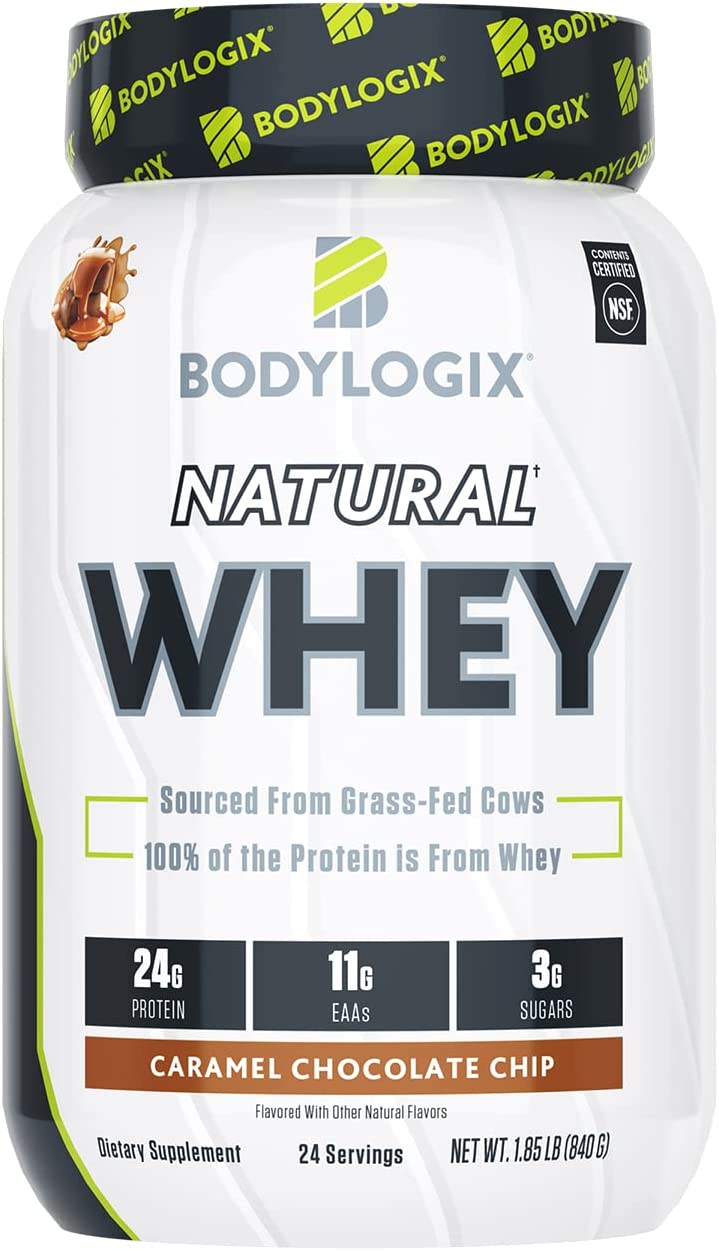
Bodylogix Whey Protein Isolate uses a whey protein blend, which includes whey protein isolate, whey protein concentrate, and whey protein peptides. As such, the protein content is quite high, with 88% of the product contents being protein by weight.
The major drawbacks to BodyLogix Natural Whey Protein are its use of a protein blend instead of pure isolate (though a pure isolate version is available), the numerous sugar substitutes, and a few excessive ingredients, like multiple emulsifiers.
Not all of these will matter to most people, so if a high protein content is what you are after, this is a good choice.
Category winners
Best whey protein overall: Transparent Labs Grass-Fed Whey Protein
Transparent Labs combines highly purified whey protein with all-natural flavoring and stevia, which makes for a great-tasting and incredibly versatile all-around whey protein.
Best whey protein for bodybuilders: Battle Ready Fuel Military Whey
With over 90% of this protein powder consisting of whey protein isolate, Battle Ready Fuel provides bodybuilding with the purest and most concentrated supply of building blocks for muscular hypertrophy. Plus, thanks to the natural cocoa flavoring, you won’t get tired of the taste.
Best whey protein for women: Ladder Whey Protein Powder
Ladder distinguishes itself by providing great-tasting whey protein that’s bolstered by vitamins, minerals, and probiotics. It’s great for women who need a meal replacement shake, or a post-workout pick-me-up.
Best tasting whey protein: Optimum Nutrition Gold Standard Double Rich Chocolate
Optimum Nutrition Gold Standard wins wide accolades for its taste, which is a big factor if you’ll be using protein multiple times per day. Taste bud fatigue can be a real problem, but not with Optimum Nutrition.
Best whey protein for weight loss: Ladder Whey Protein Powder
Ladder’s combination of rapid and slow-absorbing forms of protein mean it helps increase your metabolism and tamp down on hunger cravings for longer, making it easier to stick to your weight loss plan over the long-term.
Best whey protein for men: Transparent Labs Grass-Fed Whey Protein
Transparent Labs is a great option for men, with its focus on providing pure whey protein isolate and its lack of added sugars. Whether your goal is cutting fat or boosting muscle mass, Transparent Labs is the perfect pick for men serious about their physique.
Who should buy whey protein powder?
Whey protein has an excellent amino acid profile, making it well-suited as both a protein for weight loss and a protein for high level athletic performance. Here are the specific groups who should consider whey protein.
Athletes and bodybuilders. If you’re targeting peak performance or maximum muscle gain, whey protein is a great first option. It’s rapidly absorbed and has a complete BCAA profile, making it the tool of choice for top athletes and bodybuilders around the world.
People looking to lose weight. Don’t make the mistake of thinking that whey protein is just for athletes, though. Whey protein powder has been successfully used to induce weight loss in people who are overweight or obese.
Even better, if you’re overweight, whey protein can actually help you gain muscle while losing body fat.
Older adults who want to combat aging-related muscle loss. Whey protein is also suitable for older adults who want to stay fit and healthy as they get older. Research shows that whey supplementation is an effective way to stave off the loss of muscle mass (sarcopenia) that comes along with age, and whey protein can even help regain some of the muscle mass you’ve lost.
The versatility and flexibility of whey protein are one of its primary strengths, and almost all research on the generic effects of protein supplementation uses whey protein for this very reason.
How we ranked
The sheer number of whey protein products on the market is intimidating. Here’s how we narrowed the field to find the best.
Pure whey protein only. We only considered products that are 100% whey protein, not a mix of whey and other proteins. That made us more confident that each product was going to give you the full, scientifically-supported benefits of whey, as opposed to other protein sources.
No meal replacement shakes. We also eliminated protein products that were primarily designed as a meal replacement shake, as the focus of the ingredients in a product like this are going to be somewhat different than a proper whey protein powder.
Great taste and excellent purity. After narrowing down the field, we focused closely on a balance between purity and taste.
Highly pure whey protein powders, like MyProtein Impact Whey, are great from a purity and minimalist perspective, but the bland and chalky flavor can be off-putting.
If you’re trying to gain muscle and need to eat a lot of supplemental protein every day, a bad-tasting protein powder can serious limit your gains. So, we made sure to include good-tasting protein powders as well.
Natural extracts beat out synthetic additives for flavor. However, for protein powders that were flavored, we had a strong preference for those that used natural flavors and natural sweeteners like stevia as opposed to artificial sweeteners.
Nothing packed with sugar. We downright eliminated anything that relied too heavily on sugar for flavoring, as the negative metabolic effects of sugar in your whey protein powder are too hard to ignore.
High-concentration protein. Finally, we analyzed the absolute protein content of the whey protein powders. This gave a slight advantage to unflavored formulations, because by virtue of their lack of alternative ingredients, they can pack in slightly more protein by weight.
Still, after sorting by quality, purity, and taste, our rankings contained a good balance of pure and unflavored whey protein powders, as well as great-tasting flavored formulations that don’t sacrifice much when it comes to quality, natural ingredients. Our research team thinks these are the best whey protein powders available right now.
FAQ
Q: Is whey protein good for weight loss?
A: Yes, whey protein has been repeatedly used successfully as a way to enhance or maintain weight loss. While it might seem strange that taking a whey protein supplement, which contains a significant amount of calories, would help you lose body fat, there are some more subtle nutritional mechanisms going on under the hood.
First off, the complex molecular structure of the amino acids in whey protein mean that your body has to expend more energy to break them down compared to an equivalent amount of, say, carbohydrates.
On top of this effect, protein is also a very effective way to stimulate your body’s satiety response, which is the feeling of fullness that you get after a large meal. So, in this respect, whey protein acts as an appetite suppressant too.
Q: Is flavored whey protein powder bad?
A: Flavored protein powders get a bad rap because of low-quality products that are crammed full of artificial flavors and colors, but weak on actual protein.
Unflavored whey protein is a good ingredient for a shake or a smoothie, but if you are just mixing up your protein powder with water, you’ll probably want something with some flavor to it. Hopefully, that flavor will come from something natural, like stevia and natural chocolate, versus synthetic flavors and artificial sweeteners.
Q: Can whey protein help you build muscle while losing fat?
A: Yes, research on people engaged in weight loss programs has found that whey protein supplementation can increase the amount of fat loss and decrease the amount of lean body mass loss. The effect of this supplementation makes your weight loss program more effective in the context of overall body composition.
Q: Are there benefits to unflavored whey protein?
A: Unflavored whey protein powder is popular among people who are minimalists with regards to supplement design.
If you want 100% pure whey protein, with no sweeteners, flavoring agents, binders, or fillers, an unflavored whey protein powder is the way to go.
Related articles
- Protein for weight loss
- Hydrolyzed whey protein
- BCAAs
- Vegan protein powder
- Paleo protein
- Protein powder for women
- Protein bars
Recap
Researchers believe the high amounts of cysteine may be one of the reasons whey protein has so many health benefits. This essential amino acid stimulates production the cellular antioxidant glutathione.
More is not necessarily better when it comes to protein, because your body can only utilize a certain amount. Go for either 30-50 grams per day if you’re targeting weight loss, 1.2 to 1.8 grams per kg of body weight for athletic performance, or 2 grams per day (or more) for bodybuilding.
The range of bioactive compounds found in whey protein can help you build muscle and strength, reduce appetite and lose weight, as well as improving vital health markers like blood pressure and blood sugar levels.
For BodyNutrition‘s #1 whey protein powder recommendation, click here.